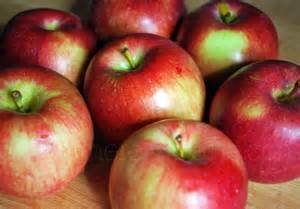Empire apples are bright red with faint white markings and a light green cap. They are a medium size, perfect for children’s school lunches. They have a crispy, crunchy texture and a creamy white interior. Developed at Cornell University in the 1940’s, they are named after their state of origin, New York, the “Empire State”. A cross between Red Delicious and McIntosh, the Empire apple offers the best characteristics of both, sweet like a Red Delicious and tart like a McIntosh. Excellent for snacking and salads, they are also good for sauces, baking, pies and freezing.
Originating in New Zealand, Gala apples were developed by apple breeder J.H.Kidd in 1934. They are a cross between Kidd’s Orange Red and Golden Delicious apples. They grow well in both warm and cold climates, and are now available year-round. The thin skin of a Gala varies in color from cream to orange, highlighted with pink to red stripes. The dense flesh is creamy yellow and crisp, and it offers a mild sweet flavor. This makes the Gala excellent for snacking, as well as a great choice for use in fresh salads, either green or fruit salads. When cooked, the flavor of a Gala becomes milder, so it pairs well with a stronger flavored apple such as a Granny Smith or a Pippin. Gala apples offer a fair amount of vitamins A, C and B. They are low in calories, high in water content, and contain a significant amount of a dietary fiber called pectin, which has been shown to lower cholesterol. Pectin also creates a feeling of “fullness.” And for many of us, snacking on fresh apples like the Gala satisfies the sweet tooth!























0 Comments